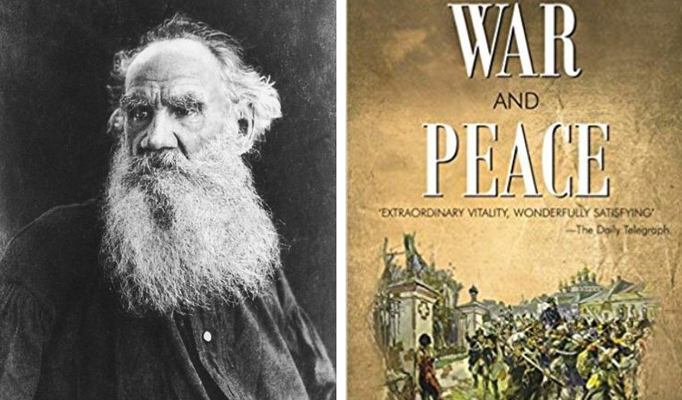
What might it take for peace to come between Ukraine and Russia? What seems impossible with people is still possible with God. What if Ukrainians and Russians would both rediscover the message of peace and reconciliation in Tolstoy’s War and Peace? Sadly, this book is currently banned in the Ukraine because of the mistaken idea that it glorifies the Russian military. Since serving in the Crimean War, Tolstoy became a committed pacifist. War & Peace never glorifies war, but rather accurately portrays how war often embitters our souls, dehumanizes us, and robs us of the love of neighbour. Ironically, the Russian Orthodox Church excommunicated Tolstoy in 1901, partially because of his questioning their uncritical support for the Russian military.
Many see Tolstoy as a Russian Charles Dickens. Considered by many as the world’s best novel, War & Peace overwhelms potential readers by its 1,400-page size. What surprised us was how deeply that Jesus’ gospel message of forgiveness was woven into this book. God is mentioned 312 times in War & Peace. Outwardly, the book is about Napoleon’s invasion of Russia, but at a deeper level, it was about human conflict and how the Kingdom of God is the only solution.
The Russian Prince Andrei, who represented the glorification of war in War & Peace, initially despised forgiveness as just for women and children. After being mortally wounded, Andrei learns to forgive his dying enemy Anatole Kuragin, and his ex-fiancée Natasha who almost ran off with Anatole. He notably commented:
Compassion, love of our brothers, for those who love us and for those who hate us, love of our enemies; yes, that love which God preached on earth…and I did not understand – that is what made me sorry to part with life, that is what remained for me had I lived. But now it is too late. I know it!
Andrei asks his doctor to get him a copy of the Gospels, saying that he had now a new source of happiness which had something to do with the Gospels. After discovering the law of love, Andrei met again with Natasha who was devastated with guilt and shame:
“Forgive me!” she whispered, raising her head and glancing at him. “Forgive me!” “I love you,” said Prince Andrei… “Forgive…!” “Forgive what?” he asked. “Forgive me for what I have done!” faltered Natasha in a scarcely audible, broken whisper, and began kissing his hand more rapidly, just touching it with her lips. “I love you more, better than before,” said Prince Andrei, lifting her face with his hand so as to look into her eyes.
This novel could have been called Love & Forgiveness. Seventy-two times, Tolstoy talks about forgiveness in War & Peace. It was not just about the war with Napoleon, it was about the war between the sexes.
Another character in War & Peace, Pierre Bezukhov, is like a Russian Forrest Gump. He is a tragically comic figure who awkwardly stumbles into all the key times of the Napoleon conflict, unexpectedly being a saviour figure, and allowing us to observe the historic conflict in-person, up-close. Everything about him is unlikely, from his being an illegitimate son to becoming the wealthiest person in all of Russia. Through dreams and visions, Pierre discovered on Napoleon’s battlefield that
To love life is to love God. Harder and more blessed than all else is to love this life in one’s sufferings, in innocent sufferings.
Through discovering God, Pierre experienced a deep tranquility and happiness. He was no longer tormented by the meaningless of life:
…a simple answer was now always ready in his soul: “Because there is a God, that God without whose will, not one hair falls from a man’s head.
Meeting God gave him such a new ability to listen that people regularly told Pierre their most intimate secrets. This deep listening was what caused the embittered princess Natasha to fall in love and marry him.
Tolstoy became so enamoured with the Sermon on the Mount that he gave away all his wealth and chose to live like a peasant, tilling the land. When he decided to give up all his book income, his wife threatened to divorce him, so he compromised by only giving away the money from any newly-written books.
Tolstoy’s book The Kingdom of God Is Within You so impacted Mahatma Gandhi that he gave it out to his followers. Gandhi was so impressed by Tolstoy’s emphasis on the Sermon on the Mount (Matthew 5 to 7) that he read Jesus’ famous Sermon every day for the rest of his life. Tolstoy’s emphasis on non-violent resistance formed the basis of Gandhi’s campaign to bring Indian nationhood. Martin Luther King Jr., after reading E. Stanley Jones’ book on Gandhi, discovered the nonviolent key to his civil rights movement. Tolstoy’s passion for peace-making might even change Russian President Putin, if he would take the time to read his fellow Russians’ book.
The late Malcolm Muggeridge deeply admired the genius of Tolstoy:
Tolstoy was one of those truly great men who come into the world at long intervals, and we need them, and we rightly continue to look to them just as the Russians do, despite all the changes that have happened.
What if instead of resenting Russia for its tragic invasion of the Ukraine, we, like Tolstoy, began to pray passionately for its transformation? Could we have faith to believe that Russia would become a Sermon on the Mount nation, overflowing with peacemakers like Tolstoy? Will you join us in trusting God for such a miracle?

Leave a Reply